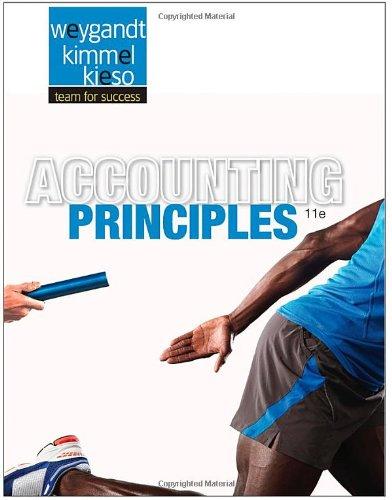Peter Nimmer opened a veterinary business in Nashville, Tennessee, on August 1, 2014. On August 31, the
Question:
Peter Nimmer opened a veterinary business in Nashville, Tennessee, on August 1, 2014. On August 31, the balance sheet showed Cash $9,000, Accounts Receivable $1,700, Supplies $600, Equipment $6,000, Accounts Payable $3,600, and Owner’s Capital $13,700.
During September, the following transactions occurred.
1. Paid $2,900 cash on accounts payable.
2. Collected $1,300 of accounts receivable.
3. Purchased additional equipment for $2,100, paying $800 in cash and the balance on account.
4. Recognized revenue of $7,800, of which $2,500 is received in cash and the balance is due in October.
5. Withdrew $1,100 cash for personal use.
6. Paid salaries $1,700, rent for September $900, and advertising expense $450.
7. Incurred utilities expense for month on account $170.
8. Received $10,000 from Capital Bank (money borrowed on a note payable).
Instructions
(a) Prepare a tabular analysis of the September transactions beginning with August 31 balances. The column headings should be as follows: Cash + Accounts Receivable + Supplies + Equipment = Notes Payable + Accounts Payable + Owner’s Capital – Owner’s Drawings + Revenues – Expenses.
(b) Prepare an income statement for September, an owner’s equity statement for September, and a balance sheet at September 30.
Accounts payable (AP) are bills to be paid as part of the normal course of business.This is a standard accounting term, one of the most common liabilities, which normally appears in the balance sheet listing of liabilities. Businesses receive... Accounts Receivable
Accounts receivables are debts owed to your company, usually from sales on credit. Accounts receivable is business asset, the sum of the money owed to you by customers who haven’t paid.The standard procedure in business-to-business sales is that... Balance Sheet
Balance sheet is a statement of the financial position of a business that list all the assets, liabilities, and owner’s equity and shareholder’s equity at a particular point of time. A balance sheet is also called as a “statement of financial...
Step by Step Answer:

Accounting Principles
ISBN: 9781118566671
11th Edition
Authors: Jerry Weygandt, Paul Kimmel, Donald Kieso





